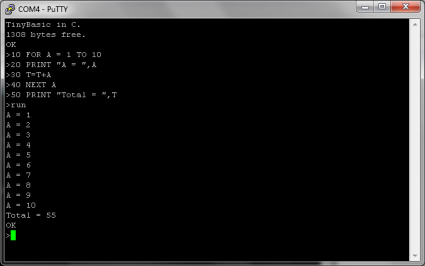Arduino Basic
 Edsger Dijkstra, Dutch computer scientist and winner of the 1972 Turing Award wrote:
Edsger Dijkstra, Dutch computer scientist and winner of the 1972 Turing Award wrote:
It is practically impossible to teach good programming to students that have had a prior exposure to BASIC: as potential programmers they are mentally mutilated beyond hope of regeneration.
While I have respect for his great contributions to the field, in my opinion, this claim falls a bit far afield. In particular, nearly everyone who learned about computers in my generation seemed to through the path of BASIC. BASIC was the lingua franca of the microcomputer revolution, and while I now see it as rather quaint and ridiculous, it provided a step into computing for many people who found that they could indeed regenerate their brain cells in spite of their early exposure.
But does BASIC have any place in the modern world? Well, I must admit, the answer might be “maybe”. Little microcontrollers like the BASIC Stamp have been overshadowed a bit by the Arduino, but I still think that having an interactive interpreter that you can use to access a small computer makes some sense. Having a small language like Tiny BASIC, augmented by a few small additions to (say) allow you to generate sounds or control I/O pins makes a great deal of sense. Thus, without further justification, take a look at this project:
The code looks pretty nice and tidy, and should be easy to extend. It allows programs of up to 1.4K to be loaded into RAM, which sounds like a trivial amount, but it’s certainly enough to blink some leds, read and write some serial data, and generally exercise some of the capabilities of the chip. Neat project!
I recall burning three or four weeks of a sabbatical getting Saccade.com on the air with Wordpress. So much tweaking…